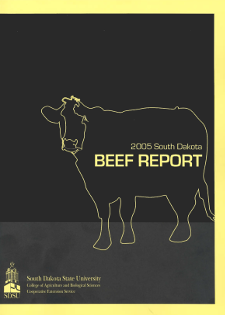Document Type
Report
Report Number
2005-14
Publication Date
2005
Keywords
dried distillers grains, solubels, replacement, supplements, cattle, forage quality
Summary
A two-year study was conducted at the South Dakota State University Southeast Research Farm in Beresford, SD, to determine the effects of feeding supplemental dried distillers grains with solubles (DDGS) on the performance of mid-gestation and non-gestating, non-lactating beef cows. Ninety-six gestating beef cows (initial BW = 1276.4 ± 22.2; initial BCS = 4.7 ± 0.09) and 96 non-gestating, non-lactating beef cows (initial BW = 1214.0 ± 20.8; initial BCS = 5.4 ± 0.10) were used for year 1 and year 2, respectively. Cows were stratified by weight and allocated to one of 15 pens. Pens were then randomly assigned to one of three treatment supplements: 1) sunflower meal (SFM), 2) a 50:50 combination of SFM and dried distillers grains plus solubles (COMB), or 3) dried distillers grains plus solubles (DDGS). Supplements were formulated to be isocaloric and isonitrogenous, but provide decreasing levels of degradable intake protein (DIP; 332.6, 256.5, 206.8 g/d year 1, 338.1, 284.9, 232.2 g/d year 2). All cows received a basal diet of ground corn stalks and were allowed ad libitum access to a salt-mineral block. Cows were fed treatment diets for 70 days. Weights were taken on day -1, 0, 35, 69, and 70. Body condition scores (BCS) were determined on day 0 and 70. Ultrasound fat dept was determined at the 12th rib and on the rump on day 0 and 70. Weight change tended (P < 0.06) to be affected by a treatment by year interaction. In year 1, cows consuming the SFM supplement gained more weight than cows consuming any of the other treatments. However, in year two, gain was not affected by treatment. Treatment had no effect on BCS or ultrasound fat depth at the 12th rib or rump. Small and inconsistent differences in performance and the lack of differences in body condition between treatments suggest that DDGS can replace an oilseed meal in protein supplements without affecting animal performance. Supplementing DDGS as a sole protein source for cows consuming poor-quality forage is a viable management alternative for producers.
Number of Pages
5
Format
application/pdf
Language
en
Publisher
South Dakota State University
Rights
Copyright © 2005 South Dakota State University
Recommended Citation
Doering-Resch, Heidi; Wright, Cody; Tjardes, Kent; Perry, George; Bruns, Kelly; and Rops, Bradley, "Effectiveness of Dried Distillers Grains with Solubles as a Replacement for Oilseed Meal in Supplements for Cattle Consuming Poor Quality Forage" (2005). South Dakota Beef Report, 2005. 15.
https://openprairie.sdstate.edu/sd_beefreport_2005/15

